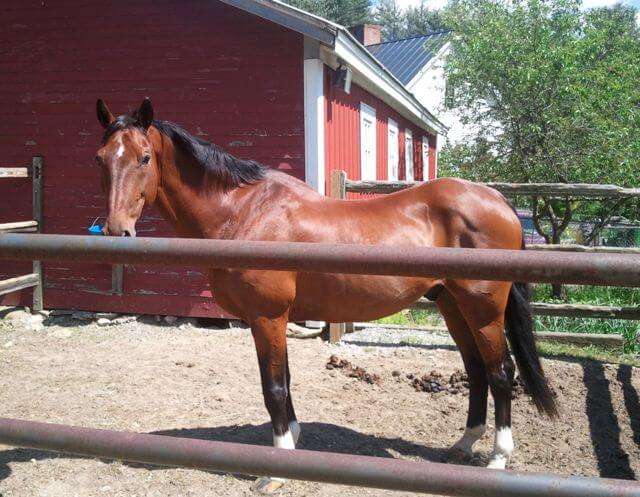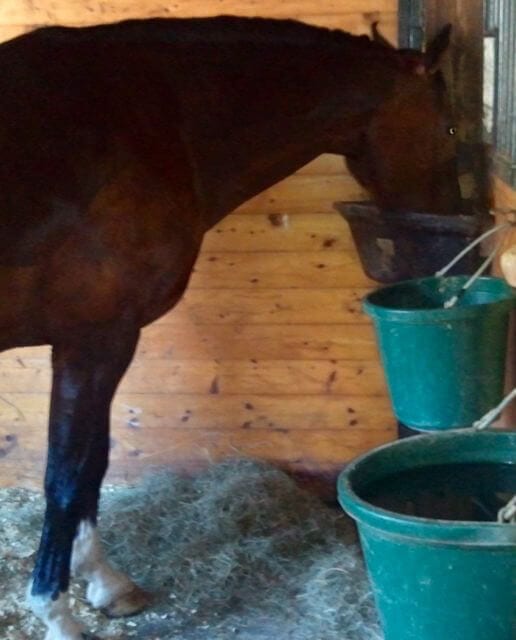Kathryn and Calabrae Part II: The Road to Recovery
They say that when it rains, it pours. But how often does it monsoon? When everything goes from bad to worse and back again, it’s hard to stay hopeful, pick up the pieces, and keep moving.
I’m speaking of my horse, Calabrae, and his recovery from a one-time farrier over-trimming. Trying solution after solution, only to see Calabrae recover and turn worse again, I had to start wondering whether we would ever fulfill my dream of us competing through the USDF levels.
Here’s what happened:
The Over-Trimming Disaster and Its Aftermath
Directly following the over-trimming, Calabrae spent five days recovering at New England Equine. He then completed three weeks of stall rest, followed by a re-check. Still, even though he was cleared back to work, he was not completely well.
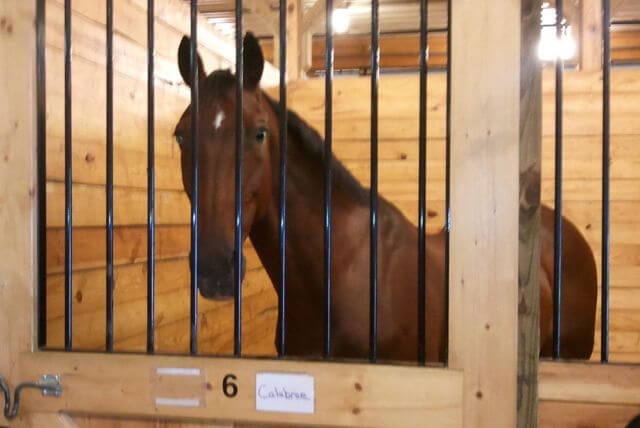
I brought him back to New England Equine for further diagnostics, at which point the team diagnosed him with deep bone bruising as a result of the farrier over-trimming the soles of his front feet from 1.80 cm to .90 cm! The team prescribed Tildren to promote bone healing, joint injections for his inflammatory reaction, and gave him fitted orthotic boots. But when he returned home, he suffered a reaction to the Tildren, which lead to a seizure, two impaction colics, and a systemic infection. Then, he stopped eating for over a month.
After five more months of healing, Calabrae finally started to recover and returned to work. I thought we were on the right track again – until he experienced massive abscessing and corns in both front feet. Once this cleared up, he was diagnosed with “under-run heels,” which were again a result of the one over-trimming. The under-run heels condition caused such pressure on his bars that his soles were separating and abscessing. He was ordered to rest for an additional three to six months and start an intensive corrective shoeing process along with other medications and supplements. That brings us to the present.
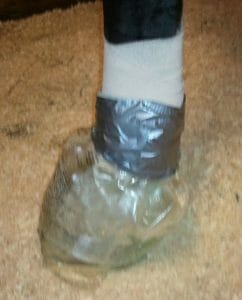
Asking the Tough Questions
Over the years, I’ve researched more products, treatments, injections, and solutions than you can imagine. It can be an overwhelming process.
I’m lucky that as a lifelong equestrian, many of the products veterinarians recommended for Calabrae were products I was not only familiar with, but also had used in the past with great results for numerous horses. It’s certainly comforting to be acquainted with some of the “main players” in my horse’s treatment. But with new horse injuries and conditions, I also had to research new medications, supplements, equipment, and/or therapies that felt totally foreign.
I’m sure I’m not the only worried horse owner who regularly talks aloud to her computer screen, asking:
– “Does that really work?”
– “How come I’ve never heard about this before?”
– “Could it hurt my horse’s health or affect another issue he may have?”
– “That’s really expensive. I wonder if it’s a bunch of horse pucky?!
Strategies for Finding a Good Horse Supplement
Like every well-intentioned horse owner, I will openly admit that I have made some mistakes along my 20-year path with horses. And like most lifelong equestrians, I’ve said many a time, “I wish I knew then what I know now.”
When I think back on the last successful product I chose for Calabrae, I think about Wellpride fish oil.
How did I make the decision?
I re-pondered my choice to try Wellpride, and concluded that I had done a lot of research in advance of trying the product. I had read case studies of horses being fed corn oil versus omega-3s; I had read reviews from people on how omega-3s benefited horses; I had consulted my veterinarian and trainer; I had researched different omega-3 products, and learned how they are processed and administered. I knew from other veterinarian-based case studies that pure liquid omega-3 supplements are far more effective than their powdered or pelleted counterparts. I also knew from humans how beneficial a high quality fish oil can be. So that’s when I asked, “Do they make fish oil for horses?”
Having done all the preliminary research, I made the choice to go with Wellpride over other companies because I felt they had the purest, most effective omega-3 product for my horse. I must say that it is an absolutely outstanding product, and the results have by far exceeded my expectations.
Going forward, I wanted to apply the same process to finding new supplements, medications, and treatments for Calabrae as I had applied to finding Wellpride.
Recovery at Last
Calabrae is finally improving. He has undergone intensive corrective shoeing and hand-walking programs, and he takes various medications and supplements. But I feel confident that the combined program has been very beneficial for him. He’s been a real trooper as he HATES not working. He’s a dressage machine, and I’ll often find him performing passage and pirouettes in his paddock of his own accord! He’s a horse that truly loves what he does, and I know this experience has been mentally trying on him, as well as physically.
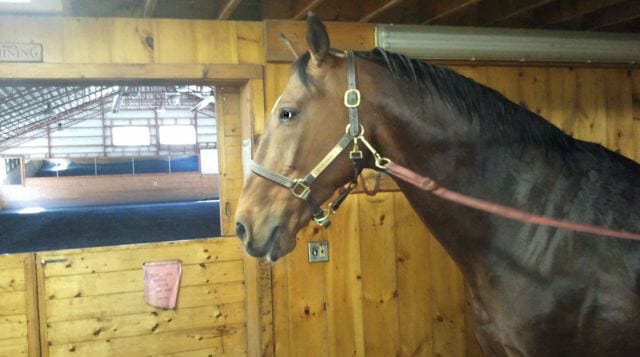
As I revealed in my last blog, Calabrae suffers from ulcers that can recur when he’s under stress. I’m happy to report that even though his over-trimming experience has been stressful, his ulcers have not returned. Much to my surprise, he has also maintained a great weight, fantastic coat, and the physical appearance of a fit, well-muscled horse. Furthermore, in the past, Calabrae struggled with being underweight, which is a common problem for many ulcer-affected and sensitive horses. Now, he’s kept his topline, which originally lead me to think he may have developed Cushing ’s disease. But, all his tests and IR functions are completely normal.
Taking his age and time off into consideration, I’m honestly astounded that he looks so fit and healthy. Calabrae was on all the other products that he’s currently taking before Wellpride, and he still had ulcer recurrences and underweight issues. I truly believe that he is in a much healthier place because of his Wellpride, and I can’t thank Wellpride enough for making a product that has allowed my horse to stay healthy and young-looking through his recovery!
Moving Forward
Calabrae is about to begin an under-saddle walking program, which will lead to a back-to-work program. It has been a long, difficult road to get us to this point. Many people have been involved in his recovery, and their expertise has been and continues to be instrumental for us both. My trainer, Jerilyn Nieder, in particularly has been a rock for me emotionally and physically. Her endless support and knowledge have been extremely helpful in Calabrae’s recovery. Additionally, my husband and parents have also been fundamental throughout this whole experience, and their continued reinforcement is very much appreciated.
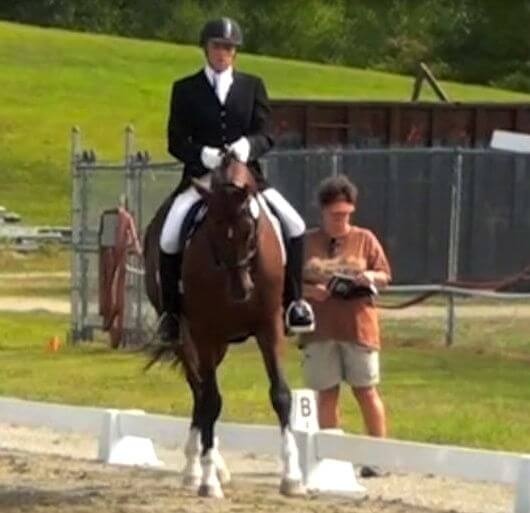
My heart goes out to anyone that is going through a similar situation to the one Cal and I have been facing. My advice from this trying experience would be to surround yourself with supportive people, find a great barn and atmosphere, ask too many questions, and try a great all-around product like Wellpride.
And most importantly, don’t give up hope. There is light at the end of the dark tunnel!


